With lithium, clinicians have long been able to treat mood disorders like major depressive disorder and bipolar disorder. Yet, this often comes at a cost: an unfortunate side effect of taking lithium supplements is a sexual dysfunction that can drastically diminish the quality of life for those who choose it as their medication.
This article will delve into the numerous connections between lithium and sexual dysfunction, examining both its underlying causes as well as potential treatments. Research has revealed that this side effect of lithium can be expressed through a wide array of symptoms such as decreased libido, erectile dysfunction, or struggles with arousal and orgasm. We’ll investigate these issues in-depth so you can understand how to manage them appropriately.
Acquiring a greater comprehension of this topic allows those taking lithium to coordinate with healthcare professionals, thereby refining their treatment and bolstering their overall health.
Table of Contents
Does Lithium Cause Sexual Problems?
While lithium treatment has been demonstrated to cause sexual dysfunction in a large percentage of patients, the precise incidence is still unclear. Studies have shown that up to 60% of people using this medication may experience some form of sexual difficulty, including decreased libido, erectile dysfunction, and impairment with arousal or climaxing. Sexual complications are an established adverse reaction associated with lithium therapy and should be weighed carefully when considering its use.
 Although the exact rationale for lithium-triggered sexual dysfunction is yet to be discovered, this medication is thought to interfere with several neurotransmitters and hormones essential for proper sexual performance such as serotonin, dopamine, and testosterone.
Although the exact rationale for lithium-triggered sexual dysfunction is yet to be discovered, this medication is thought to interfere with several neurotransmitters and hormones essential for proper sexual performance such as serotonin, dopamine, and testosterone.
Apart from that, it may also cause a range of physical or psychological side effects like fatigue, weight gain, and mood disorders which can further impair your libido.
It’s vital to recognize that not all people taking lithium will go through sexual dysfunction, and the severity of this side effect can vary. Plus, the advantages of treatment with lithium in controlling mood disorders normally surpass any potential risks associated with experiencing sexual dysfunction.
If you’re enduring sexual troubles while taking lithium, it is imperative to alert your healthcare provider. They may modify the dosage of your medication, provide extra medications to control side effects, or propose other methods to better your sexual function. Don’t remain quiet – connecting with a qualified medical professional can make all the difference.
What is the Most Concerning Side Effect of Lithium?
One of the most concerning side effects of lithium treatment is lithium toxicity, also known as lithium overdose. Lithium toxicity occurs when the concentration of lithium in the blood becomes too high, which can result in a wide range of symptoms ranging from mild to severe. Mild symptoms may include nausea, vomiting, diarrhea, and tremors, while more severe symptoms can include confusion, seizures, kidney failure, and even death.
The risk of lithium toxicity is increased by various factors, including dehydration, renal impairment, and drug interactions. Moreover, because the therapeutic window of lithium is narrow, meaning the difference between the therapeutic dose and toxic dose is small, it is important to monitor blood lithium levels carefully.
Blood tests to monitor lithium levels are typically done periodically, especially during the initial phase of treatment or when adjusting the dose.
While lithium toxicity is a serious concern, it is important to note that with appropriate monitoring and management, the risk of developing this side effect can be minimized.
Individuals taking lithium should be aware of the signs and symptoms of lithium toxicity, adhere to their prescribed dosage, and communicate regularly with their healthcare provider to ensure optimal treatment outcomes.
What are the Side Effects of Lithium Men?
Lithium therapy can produce a gamut of adverse effects in men, like sexual dysfunction, weight gain, and tremors. Sexual deficiency is one of the most pervasive negative outcomes associated with lithium treatment, experienced by up to 60% of those taking it; symptoms may include decreased libido and erectile issues as well as difficulty reaching arousal or climaxing.
Weight gain is another recurrent side effect which could be due to increased hunger levels, metabolic slowdown, or fluid retention among other reasons.
 Lithium treatment can potentially cause tremors, i.e., involuntary shaking of the hands, arms, legs, or head which may range from mild to severe intensity. Furthermore, men taking lithium might experience muscle weakness, dry mouth, and thirst as physical side effects.
Lithium treatment can potentially cause tremors, i.e., involuntary shaking of the hands, arms, legs, or head which may range from mild to severe intensity. Furthermore, men taking lithium might experience muscle weakness, dry mouth, and thirst as physical side effects.
Along with these physical symptoms, there is a possibility for mood changes including drowsiness and cognitive impairment too due to this medicine’s effectiveness in treating certain mental health conditions.
It is essential to remember that not everyone who takes lithium will experience all of the possible side effects, and the intensity can vary.
Despite this fact, the advantages of lithium therapy for managing mood disorders usually surpass any potential risks related to these consequences. If you endure any effects from taking lithium, it is critical to talk with your medical practitioner right away.
They could possibly adjust your dosage amounts, offer more medications to regulate the side effects, or suggest alternative solutions that will increase the chances of a positive outcome while on treatment.
Lithium and Viagra
Here is a table comparing the effects of lithium and Viagra:
| Lithium | Viagra | |
|---|---|---|
| Purpose | Bipolar disorder and major depressive disorder can be effectively managed with the right treatment. | Curing erectile dysfunction has never been easier! With our new treatment, you can say goodbye to embarrassing moments and get back the confidence that comes with a healthy sex life. |
| Sexual Side Effects | A potential downside to this medication is the risk of developing erectile dysfunction. | Improves erectile function |
| Cardiovascular Effects | May cause hypertension and increase the risk of heart attack or stroke | Can cause a significant decrease in blood pressure |
| Risk of Toxicity | When combined, these two agents can dramatically increase the likelihood of lithium toxicity. | Not associated with a risk of toxicity when used appropriately |
| Risk of Priapism | Not linked to any heightened danger of priapism | By taking the risk, you can potentially develop a painful and long-lasting erection that could become permanent. |
It’s crucial to understand that these medicines can be helpful for controlling certain medical issues, however, they must only be taken under the direction of a healthcare professional who will observe and adjust treatment as needed in order to avoid any potential adverse reactions.
Lithium and Testosterone
The interplay between lithium, a widely used mood stabilizer, and testosterone, a primary male sex hormone, has garnered interest in the realm of endocrinology and mental health. Understanding how lithium affects testosterone levels is crucial, as it can have significant implications for individuals on lithium therapy, particularly men.
Lithium’s impact on testosterone levels is complex and multifaceted. While lithium is primarily recognized for its mood-stabilizing properties in the context of bipolar disorder and depression, it can also influence various hormonal pathways, including those involving testosterone.
Several studies have indicated that chronic lithium use may lead to reduced testosterone levels, particularly in men. This effect is thought to result from lithium’s influence on the endocrine system. Lithium can affect the hypothalamic-pituitary-gonadal axis, a critical component of the endocrine system responsible for regulating testosterone production. By disrupting this axis, lithium may hinder the secretion of luteinizing hormone (LH) and follicle-stimulating hormone (FSH), both of which play pivotal roles in testosterone synthesis. Consequently, lower LH and FSH levels can contribute to reduced testosterone production.
Moreover, lithium may directly affect Leydig cells in the testes, where testosterone is synthesized. It can interfere with Leydig cell function, further diminishing testosterone production.
The consequences of decreased testosterone levels in men can be significant. Low testosterone is associated with various adverse effects, including reduced libido, fatigue, muscle loss, and mood disturbances. Therefore, men on long-term lithium therapy should be closely monitored for signs of low testosterone and may require interventions such as testosterone replacement therapy.
It is important to note that the relationship between lithium and testosterone is not entirely one-sided. Some studies have suggested that lithium may have a protective effect against certain endocrine conditions, such as hyperthyroidism, which can indirectly influence testosterone levels.
In conclusion, there is a complex interaction between lithium and testosterone. Lithium therapy may lead to reduced testosterone levels in men, primarily by disrupting the hypothalamic-pituitary-gonadal axis and directly affecting Leydig cells. Clinicians should be vigilant in monitoring testosterone levels in individuals on long-term lithium therapy to address potential hormonal imbalances and their associated symptoms. The decision to use lithium and its potential effects on testosterone should be carefully considered on a case-by-case basis, weighing the benefits of mood stabilization against the potential hormonal side effects.
Frequently Asked Questions
Does Lithium Cause Erectile Dysfunction?
Yes, lithium treatment can cause erectile dysfunction (ED), which is the inability to achieve or maintain an erection sufficient for sexual activity. Erectile dysfunction is one of the most common sexual side effects of lithium and can affect up to 60% of people taking the medication.
Does Lithium Increase Libido?
Contrary to popular belief, lithium treatment is not associated with increased libido. In fact, this particular medication has been linked to sexual dysfunction in up to 60% of users – particularly decreased libido.
Conclusion
To summarize, lithium is widely employed to treat bipolar disorder and major depressive disorder. While the medication has proven useful in managing these afflictions, it may also lead to sexual complications such as erectile dysfunction or lack of interest in sex.
Though the precise science behind lithium’s link to sexual dysfunction remains unclear, it is believed that blood flow disruption, hormone discrepancies, and neurotransmitter malfunctions are all in play. If you take lithium medication and experience any concerning side effects related to your sex life, do not hesitate to talk with your doctor – they may be able to readjust the dosage or suggest an alternate treatment plan.
If you are apprehensive about the sexual side effects of lithium or simply have queries regarding it, make sure to bring them up with your healthcare provider. They will be able to guide you through an understanding of the benefits and risks that come along with this treatment so that together, you can find a suitable way to manage your condition.
